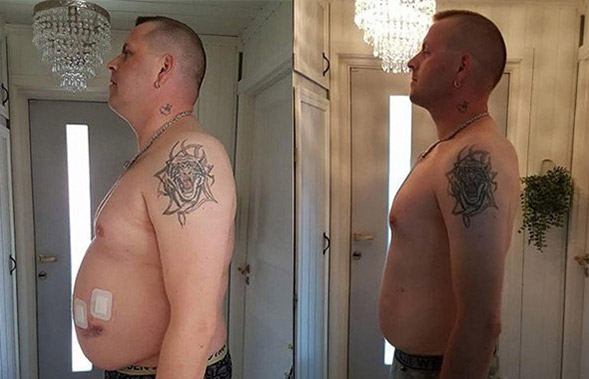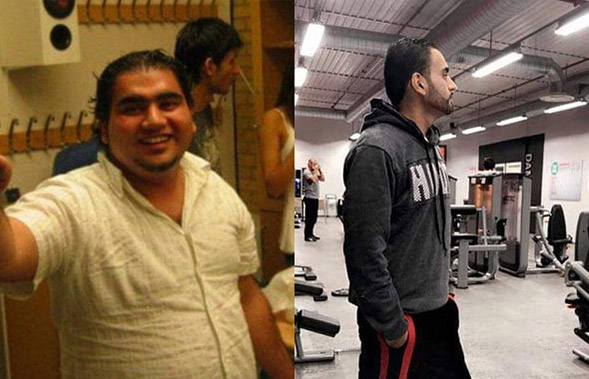Book Free Consultation
| Gastric Balloon | BMI 27+ |
| Gastric Sleeve | BMI 30+ |
| Gastric Bypass | BMI 35+ |
Choose the procedure that suits you best
Weight: Kg | Height: cm |
10 Reasons to choose us
BMI Range
Enter your body profile details to calculate the result.
Table of contents [hide]
- What is gastric bypass?
- How Does Gastric Bypass Work?
- Benefits
- Risks
- Who is a Candidate?
- Evaluating Patient Preparedness
- At the Clinic
- Financial Preparation
- Cost of Gastric Bypass Surgery
- Life After Gastric Bypass
- Tips for a Successful Postoperative Life
- Potential Health Problems Following Gastric Bypass Surgery
- Weight Loss Surgery FAQs
What is gastric bypass?
It’s a common form of weight loss or “bariatric” surgery. It produces reliable results with minimal side effects and carries what most doctors and patients consider to be acceptable risks. Gastric bypass history goes back more than half a century and as such there are no mysteries attached to it for either the surgeon or the patient.
How Does Gastric Bypass Work?
During this type of bariatric surgery a large section of the stomach is literally stapled off creating a tiny pouch which will serve as the new stomach. This is then connected to the small intestine. As a result patients are unable to eat as much as they did previously because the new, smaller stomach simply can’t handle it and after just a small amount of food they feel full. Bypassing the bulk of the stomach in this manner creates a situation where some of the nutrients in food are not properly absorbed and the patient loses weight.
While gastric bypass has become a commonplace procedure, it is not one without risks (which we will get into shortly) nor is it a quick fix weight loss solution. It entails a lifetime commitment to eating better, taking the prescribed supplemental vitamins and minerals and avoiding things like fatty foods and sweets.
Gastric Bypass Surgery Package 58 900,-NOK
What’s included in the package – read here.
Benefits
Those wondering “what is gastric bypass and what are the benefits” can rest assured those benefits are real and quantifiable and have been shown through decades of experience to be long lasting and sustainable, which is the reason why this surgery has become so popular. Those benefits include:
– Significant weight loss – Because the capacity of the stomach is reduced so drastically, the patient simply can’t consume anything like the volume of food they did previously. As a result, the ensuing weight loss is rapid and significant. It’s not unheard of for patients to lose as much as 50% of their body weight within the first year following surgery. Patients need to keep in mind though that in order for this weight loss to become permanent, they will need to commit to positive dietary and lifestyle changes, as mentioned above.
– Reduction in health risks associated with obesity – Obesity carries with it a number of serious, potentially life-threatening conditions including heart disease, diabetes, hypertension and a variety of sleep disorders. The weight loss associated with gastric bypass surgery can eliminate or, at the very least, significantly reduce the threat posed by these co-morbidities. Beyond simple cosmetic benefits this is perhaps the most compelling reason to undergo bariatric surgery.
– Increased life expectancy – By reducing or eliminating a rash of serious health conditions associated with obesity, this type of bariatric surgery can actually result in a significant increase in life expectancy for those who commit to the necessary dietary and lifestyle changes required. At the same time, daily quality of life is also significantly enhanced so one typically lives better for longer in the wake of this type of surgery.
– Lower overall surgical impact – In most cases the gastric bypass operation is performed laparoscopically. Laparoscopic surgery (also known as “minimally invasive surgery” (MIS) “keyhole surgery” or even “bandaid surgery”) is a form of surgery that does not require a wholesale opening up of the body cavity. Instead, smaller incisions are made and surgery is performed with the help of a tiny video camera which provides the surgeon a clear, close up view of the affected area. In most cases, pain and haemorrhaging are significantly reduced by laparoscopic surgery and recovery times are far shorter than those associated with “open” surgical procedures. Gastric bypass scars produced by laparoscopy are also far smaller than those produced by open surgery.
– Higher degree of overall health – As we mentioned, obese individuals who undergo this type of surgery typically experience a higher quality of life afterwards. They are able to move around with ease, engage in outdoor activities that might have been impossible for them prior to surgery, and they are also free of the stigma that comes with perhaps needing a mobility scooter to get around or taking up 2 seats on a bus or plane. Stress on the skeletal system in general and joints in particular is also greatly reduced.
– Financial benefits – One lesser discussed benefit of bariatric procedures is the potential financial benefit. Eating just a fraction of what one ate previously can result in significant savings at the supermarket. Being in better health will likely result in one being more productive at their job and increase their earning potential. Patients won’t need mobility assistance devices either. In addition, being lighter and in better overall health should result in fewer trips to the doctor or emergency room. It’s also possible that a patient’s insurance company may cover part or even all of the cost of the surgery itself and it may also be easier to obtain health and life insurance at reasonable rates following this type of surgery.
Risks
Gastric bypass surgery is just that, surgery. As such, it carries well known risks. Most of these risks fall into the “acceptable” category for both patients and doctors, although some of them are potentially quite serious. While the vast majority of people who undergo this type of procedure experience no significant side effects or complications, side effects and complications are a possibility. Therefore It’s important that you understand the risks involved before deciding to undergo a gastric bypass surgery procedure. Those risks include:
– Pulmonary embolism – There is a less than 1% chance that a patient may experience pulmonary embolism. Pulmonary embolism occurs when a substance travels through the veins into the lungs, where it creates a blockage. Symptoms include chest pain and shortness of breath.
– Leakage – In a small number of cases, there may be leakage of fluid into the abdominal cavity with infection being a common result. Antibiotics are often effective in alleviating symptoms although if the leakage is significant it may have to be addressed surgically.
– Ulceration of the Anastomosis – In a small percentage of cases, ulcers will form on the anastomosis of the intestine. In most cases, the condition can be effectively treated with dietary adjustments or medication.
– Scarification – Internal scarring is a risk with any type of surgery and that’s certainly the case with bariatric procedures. In a small number of cases scars can develop during the postoperative period that result in a narrowing of the intestinal tract. This narrowing can make it difficult for liquids to pass, which can cause significant discomfort and become a serious issue if left untreated. Thankfully, a fairly routine gastro-endoscopic procedure can usually correct the problem.
– Vitamin deficiency – This is likely the most common negative side effect of this type of procedure. The modified stomach is not able to process nutrients to the same degree of effectiveness as it was previously. As a result, patients typically need to supplement their diet with a number of different vitamins and minerals and may need to do so regularly for many years. Most long term complications are the result of patients failing to take vitamins post gastric bypass, either because they forget or simply aren’t convinced of the medical necessity.
– Gastric dumping – Gastric dumping happens when food passes too quickly from the stomach into the small intestine. Dumping syndrome, as it’s also known, can cause mild to severe diarrhoea and/or abdominal cramps shortly after eating. Since most of the time dumping is caused by sugary foods, it can be prevented by alterations in your gastric bypass diet.
– Death – While it is extremely rare, there have been isolated cases where patients have died during or after the procedure. Not to minimize the risk, but the same can be said for virtually any type of major surgery.

Who is a Candidate?
While the gastric bypass procedure is a common form of bariatric or weight loss surgery, it’s not for everyone. As we discussed above, it brings with it an array of possible side effects, complications and general health risks. In addition, it’s not like an appendectomy where, after a brief recovery period, the patient is free to resume their normal life. Bariatric procedures require the patient to adapt a completely new lifestyle if it is to be considered successful in the long run. Many are sufficiently motivated to do so, while others are not.
Standard Qualification Guidelines
This type of bariatric procedure can produce life-altering results. About that the record is clear. But while this type of weight loss surgery can indeed lead to a better, longer, healthier life free of the threat of high blood pressure, heart disease, diabetes, sleep disorders and more, it can also lead to significant complications, particularly if the patient is not able to muster the commitment necessary to the formulation of new dietary and lifestyle habits. Because of the potential downside, it’s crucial that doctors carefully screen prospective candidates in order to make sure the people chosen stand a reasonable chance of becoming gastric bypass success stories.
In the most general terms you may qualify for this type of gastric surgery if you:
– Possess a body mass index (BMI) of 35 or greater.
– Have tried repeatedly with little or no success to lose weight through traditional diet and exercise programs.
– You have a BMI of greater than 30 and you are experiencing serious health problems directly related to your weight. These may include sleep apnea, high blood pressure and diabetes.
– You have gone through puberty but are still a teenager, you have a BMI of 30 or more and you are experiencing serious health issues related to your weight such as type 2 diabetes.
Evaluating Patient Preparedness
If you meet the above guidelines and have decided to pursue gastric bypass surgery abroad, you will need to either call the clinic in question or complete an enquiry form on their website. A Patient Coordinator will then ring you up to discuss options. The Patient Coordinator in such cases is a vital link between the patient and the medical team both in the lead up to, and the aftermath of, surgery. Once the Patient Coordinator has finished the initial phone evaluation all necessary documents will be emailed to you along with a health questionnaire. It’s crucial that you fill out this questionnaire to the best of your ability. If you have any questions you should feel free to contact the Patient Coordinator who will be happy to assist you.
Once your health questionnaire has been completed and sent to the clinic it will be thoroughly reviewed by the medical team. The doctors will then determine your suitability for the gastric bypass procedure. Once the doctors have confirmed your suitability it will be time to proceed to the next phase of evaluation which will commence upon your arrival at the clinic.
At the Clinic
Upon arrival you will have a private consultation with both the surgeon who will be performing the procedure as well as the anaesthetist. A series of tests will be administered in order to ensure you are physically prepared to undergo gastric bypass. The preoperative test regimen is composed of the following:
– A complete chemistry panel.
– A glucose tolerance test looking for signs of diabetes.
– A complete blood count.
– An Electrocardiogram or ECG.
– Lung X-rays.
– An ultrasound examination of the abdomen, liver, kidneys, spleen and gallbladder.
– A gastroscopy using a miniature camera.
In the extremely unlikely event a previously unknown health condition such as an ulcer is revealed by the preoperative tests the doctor may recommend postponing the procedure for a few weeks in order to cure the condition. The surgeon will then perform another gastroscopy or other appropriate procedure to verify the situation has been cleared up so that surgery can proceed.
While there is no specific age before or after which a person is forbidden to undergo the gastric bypass surgery procedure it’s only fairly recently that it has come to be considered safe for both seniors and teenagers. As such these individuals may need to endure closer scrutiny before the procedure is approved for them.
Note: Should a patient’s health questionnaire or the private consultation reveal evidence of psychiatric issues or drug and alcohol abuse the attending surgeon may request a written statement from the patient’s psychiatrist or GP attesting to the fact that surgery will not pose any special risk to them.
Financial Preparation
Gastric bypass cost may present significant financial hurdles a patient has difficulty clearing. It’s possible that your health insurance plan may cover some or even all of the cost of this type of weight loss surgery, but you will need to be sure you have pre-approval from the insurer prior to surgery. The same goes for any other type of medical assistance program. In order to receive pre-approval, members of the evaluation team will need to sign off on the notion that this procedure is not only justified but necessary from a medical standpoint.
At the same time, different insurers may impose different standards of proof before they’ll be willing to pre-approve the gastric bypass cost for Norway residents. Some, in fact, simply won’t cover it at all. If that is the case with your insurance company, the sooner you find out the better so that you can make alternative arrangements. Those arrangements may include seeking assistance from relatives or paying for most or all of the procedure out of your own pocket. Again, the gastric bypass price can be substantial, so it’s crucial to have the financial aspect straightened out as early in the process.
Cost of Gastric Bypass Surgery
Life After Gastric Bypass
It’s important to keep a number of things in mind when it comes to this type of weight loss surgery. Perhaps primary among them is the fact that this is not a miracle cure that is going to solve all your problems and deliver you a worry free life. There is no guarantee that you’ll lose as much weight as you hope and, if you are not diligent in following the recommendations of your doctor, you will likely have trouble keeping the weight off in the long term. Failure to comply with postoperative lifestyle and dietary changes may also lead to very unpleasant or downright dangerous complications.
All that said, if you’ve jumped all the evaluation hurdles, made sure your financial ducks are in a row and undergone the procedure, it is now time to deal with the aftermath.
Tips for a Successful Postoperative Life
In order to enjoy a successful transition to your new, slimmer life it’s helpful to fine tune your outlook on eating in general, as well as develop habits that will hold you in good stead. Here are a few suggestions to get you started:
– Remember this is not dieting – While there may be gastric bypass diet recipes involved at some point, this is more than a type of imposed dieting, it is a sea change in your relationship to food, your relationship to the world and your relationship to yourself. It’s not something you can set aside and try again when you’re in the mood like a fad diet. It will require a lifetime commitment to healthy eating, exercise and the taking of essential supplements, among other things.
– Try getting a hobby – You’ll want to develop interests in your life that will allow you to shift the focus away from food. There are any number of things that will allow you to do this, while also allowing you to express yourself creatively such as drawing and painting, swimming, low impact athletics, taking night courses and traveling.
– Exercise – We just mentioned low impact athletics, but it bears expanding on. In most cases, those who show the best long term results are those who incorporate exercise into their daily routine. Remember that you don’t have to start by deadlifting 500 pounds. Start simple by walking and gradually build upon that. Taking the stairs is a great way to get and stay in shape, while thai chi will allow you to gain flexibility and balance while building strength through your core.
– Continue counselling – Chances are you were required to seek some form of counselling prior to surgery as part of the evaluation process. There’s really no good reason to give it up after surgery. Counselling can help you deal more effectively with the emotional challenges that lie ahead and keep you on the straight and narrow so that you’re not tempted to sabotage yourself by abandoning supplements or veering from your recommended diet.
– Seek out support – There are more people out there that are going through what you’re going through than you know. Many of them have formed weight loss surgery support groups. Seek them out. They’re not hard to find. Chances are any member of your evaluation team can point you in the right direction to make contact. Statistics show that people who join support groups have a higher long term success rate than those who try and go it alone.
Potential Health Problems Following Gastric Bypass Surgery
While we covered the potential risks above we need to take a closer look at some of the more dangerous potential health problems that can occur in the wake of gastric surgery.
– Vitamin deficiencies – This is probably the most common health problem that befalls those who have undergone weight loss surgery. It occurs because the newer, smaller stomach is no longer able to glean all the nutrients from food that it used to. This malabsorption phenomenon can lead to critical shortages of crucial vitamins and minerals which, if left unchecked, can cause a rash of problems ranging from nuisance level to deadly serious. Anaemia, osteoporosis, cognitive deficits, shortness of breath, lack of energy, vision problems and more are all on the table for those who fail to take supplemental vitamins and minerals. No, it’s not easy to get and stay in the habit of taking supplements each day but it must be done if you’re to enjoy the long term benefits of the gastric bypass procedure.
– Malnutrition – While it’s not common malnutrition in the wake of weight loss surgery does sometimes occur and when it does it can be a significant issue. In some cases malnutrition becomes an issue because the passage between the new, smaller stomach and the intestinal bypass connected during surgery is too small. As it is, someone who has undergone this type of bariatric surgery is already constrained regarding how much they can eat. If a further constraint is introduced unwittingly things can get complicated quickly. In other cases malnutrition may arise because the patient has neglected to take the required vitamin and mineral supplements. In either case it’s a situation that needs to be addressed quickly and effectively.
– Regaining lost weight – Patients who have undergone gastric bypass sometimes undermine themselves and sabotage their weight loss efforts by eating too frequently. They’ll cook a large dinner for themselves, eat until they’re full, wait a short time and then come back and eat more; repeating the process until all the food is gone. Essentially they go from eating big meals in single settings before the surgery to eating the same amount after surgery but spreading it out over the course of the day. No good will come from this practice. All this eating, even when done in small increments, will also have the effect of stretching out the stomach so that gradually the amount that can be eaten gets larger and larger.
This points out the need to build healthy new habits regarding food possibly starting with a gastric bypass pre op diet. It also indicates that continual counselling for postoperative patients is a good idea in order to reinforce motivation and stay mindful of subtle tricks one may play with oneself. Not all postoperative overeating is necessarily the fault of the patient however. It’s possible there may be some mechanical issues involved left over from the surgery itself, such as:
– Reconnection of the old stomach – It’s extremely rare but still possible that the new smaller stomach pouch may have found a way to reconnect to the larger stomach that was stapled off. If this is the case it may take longer for the patient to feel satiated resulting in their eating more food than they should.
– The stomach to intestine connection may be too large – While a too small connection between the new stomach and the small intestine bypass can lead to malnutrition, too large a connection can lead to unexpected weight gain. This issue as well as the reconnection problem just described, can usually be fixed rather easily via a simple surgical procedure.
Weight Loss Surgery FAQs
Is there a difference between being obese and just being overweight? – To be considered “overweight” a person just needs to weigh more than what is considered healthy for their height. In general terms a person would be considered overweight if their body mass index (BMI) was between 25 and 29.9. A person with a BMI greater than 30 is technically considered “obese”. While someone with a BMI between 35 and 39.9 is considered severely obese and someone whose body mass index exceeds 40 is considered morbidly obese. So the short answer to the question of whether there is a difference between “overweight” and “obese” is “yes”.
What is the BMI? – The body mass index has been around for decades and is derived from formulas that go back centuries. The BMI is a measure of weight in relation to height though the standard for what is considered “normal” and what is considered “overweight” has changed some over the years. In the 70s and early 80s normal was considered 27.8 for men and 27.3 for women. Complaints emerged that separating the two represented a kind of sexism and so the two measures were consolidated in 1998 and what is considered normal BMI was modified to a range of 25 to 29.9. With anything over 30 being considered obese. There are plenty of health professionals today who take issue with both the consolidation of the two standards and the lowering of “normal” to 25 but for now the BMI is what it is and it is one of the measures by which gastric bypass surgery procedure candidates are judged.
Is there a gastric bypass surgery age limit? – In the not too distant past weight loss surgery of this kind was considered inappropriate for teens as well as senior citizens. But as the procedure has become increasingly commonplace the “safe” range has been expanded to include post-pubescent teens and people over 60. Typically however there is a higher level of proof required in order for teens to get approval for this type of surgery. Not least because people at that age have very little concept of what a lifetime commitment actually entails. At the other end of the spectrum patients over 65 are also held to a higher standard of proof simply because major surgery on anyone of that age or older carries significant risk of morbidity. Since risk then often outweighs any benefit a person may enjoy for a short while this type of surgery in the elderly is often discouraged.
What tests will I have to undergo before surgery? – Tests that are commonly given in preparation for bariatric surgery include:
– Complete Chemistry Panel.
– A glucose tolerance test as a way to test for diabetes.
– A complete blood count.
– Electrocardiogram and chest x-ray.
– Gastroscopy.
– Gallbladder ultrasound.
– Abdominal ultrasound.
– Ultrasound of the liver, kidneys and spleen.
The point of these tests is to provide the surgeon with the most complete picture possible of the patient before embarking on such a life altering process. While many will desire this type of weight loss surgery the fact is not everyone is suited to it. These tests help weed out those who are not good candidates.
What is a “GI evaluation and why do I need it? – Some pre-existing GI conditions such as hiatus hernia, peptic ulcer and esophageal reflux may lead to postoperative complications. As such it’s important for your surgeon to identify any problems beforehand and, if possible, rectify them. This will help avoid complications during surgery as well. The presence of these conditions does not necessarily preclude a person from having weight loss surgery but best practices demand the mitigation of as many potential complicating factors as possible prior to surgery.
Will you conduct a psychiatric evaluation? – We do not conduct our own psychiatric evaluation. However, as noted above, if the preliminary questionnaire or the private pre-operative consultation suggests the presence of certain psychiatric issues the surgeon may request – or in some cases require – a note from the patient’s psychiatrist attesting to the fact that surgery poses no threat to the patient.
Is laparoscopic surgery safe? – As a general rule, yes. However if the question is “Is laparoscopic surgery safer than other types of surgery?” the answer is “no”. The advantages of laparoscopic surgery lie in the fact that it leaves smaller scars, makes for a shorter hospital stay and can require less recovery time for gastric bypass surgery. But it is still surgery and as such still subjects the patient to typical surgical risks.
How long does gastric surgery take? – In most cases the procedure can be completed in around 1.5-2 hours. Sometimes a bit longer depending on the patient. The total time spent in the operating room however will likely be longer simply because of prep work involved.
Will I be in a lot of pain afterward? – The doctor and medical team will make every reasonable effort to control the amount of pain you experience in the aftermath of surgery. Postoperative efforts will concentrate on getting you back up and active as quickly as possible as this will aid in the recovery process. Pain management following this type of procedure sometimes includes a system whereby some patients are able to self-medicate. That is, give themselves a dose of painkiller when they feel they need it.
Will I be in hospital long? – In most cases patients will be on their feet within 1 day of surgery and be discharged within 3 days. If you compare gastric sleeve vs gastric bypass you’ll find they’re pretty much the same in this regard. There are exceptions of course. Particularly if there have been complications. But most people are surprised at how quickly they return home after such a major procedure.
How long before I can walk after surgery? – Assuming there are no complications you should be on your feet and able to take a short walk within 24 hours of completing surgery as we mentioned above. Once home you should enjoy normal mobility but you’ll need help for a while with things that require lifting or other types of physical exertion.
Will I have a drain after surgery? – Most likely, no. But sometimes, there is a need for a small tube to be installed as part of the surgical process to allow fluids to drain from the abdomen after surgery. If this is the case, it typically won’t be there for more than a few days and shouldn’t produce more than minimal discomfort.
Can I drive myself home from the hospital? – While you may be physically able to do so the fact that you are likely still under the influence of narcotic painkillers makes it unwise in the extreme to do so. Your reaction times will be reduced, perhaps significantly meaning you’re not just a danger to yourself but to everyone else on the road.
Can I drink alcohol after gastric bypass surgery? – Alcohol after gastric bypass surgery can produce very uncomfortable effects and you’ll find your tolerance, at least initially, is practically zero. Most doctors recommend waiting a year before having an adult beverage after this procedure and most people who have undergone it and tried drinking shortly after will attest to the wisdom of waiting.
What are the foods you can’t eat after gastric bypass surgery? – Red meat contains gristle which can be devilishly difficult for the stomach to break down. It’s the kind of thing even healthy people can have difficulty processing. So in your compromised state after weight loss surgery you probably shouldn’t tempt fate and order up a steak. The gristle can actually plug the outlet from your new stomach to the small intestine bypass causing significant discomfort. Dairy is usually a no-no too. Along with sugar.
What type of doctor does gastric bypass? – Bariatric surgeons usually start out as general surgeons and then decide to specialize later in their careers. It’s not uncommon for them to participate in bariatric surgery fellowships and they may eventually wind up seeking and receiving board certification related to their specialty.
Do I have to avoid dairy products? – Milk contains lactose which is, in effect, milk sugar. Lactose typically goes undigested in the reconfigured stomach and winds up more or less intact in the large intestine where it can cause irritation and gas. The exact amount of irritation depends on the individual. Some will feel very little while for others it will be quite an uncomfortable experience and may lead to diarrhoea as well.
Can I snack between meals? – Snacking is one habit you’d do well to rid yourself of and the sooner the better. In fact, your doctor will insist on it. You will hear about the need to avoid snacking during the lead up to surgery and in most of your consultations after surgery. Snacking undermines the very reason for shouldering the gastric bypass surgery cost in the first place because it greatly increases your daily calorie intake. Snacking is typically an impulse activity and as such you can train yourself to avoid the impulse. The most important thing to remember when trying to train yourself not to snack is that it’s much easier to avoid taking that first bite then it is to stop snacking once you’ve started.
Will I have to drink a ton of water? – Immediately following surgery you are going to start losing weight. The weight loss process is one that produces a lot of waste that needs to be eliminated. The easiest way to do so is through urinating. If you don’t eliminate this waste effectively it could lead to the formation of kidney stones; a very painful affliction indeed. So, yes. You will have to get used to drinking more water than you are probably used to drinking. But it’s for a good reason and you’ll know it’s working primarily by the problems you don’t develop. Keep in mind also that a stomach full of water is one that doesn’t typically crave food. So drinking plenty of water can aid in your efforts to avoid snacking.
Will I have to become an exercise freak? – You won’t have to take up residence at the health club but you will need to get used to exercising to some degree. In the wake of surgery, with so much less food entering your body, your system will start looking for alternative energy sources and will draw on muscle mass before it draws on fat. If you don’t use your muscles on a fairly regular basis your body will assume you no longer need those muscles and start burning them as fuel. Loss of muscle mass will occur and you’ll wind up in an unhealthy state of overall weakness. As we said you don’t have to live at the gym but 15 to 20 minutes of aerobic activity per day should be enough to maintain muscle tone and signal to your body to leave your muscles alone.
How to prevent sagging skin after gastric bypass? – It’s quite common for people who have undergone successful bypass surgery of this kind to undergo one or more body contouring surgeries down the line in order to reign in loose skin. Talk to your surgeon to learn more.
Will gastric bypass surgery help me to lose weight?
Gastric bypass surgery means the reduction of the patient’s stomach size. This procedure prompts rapid weight loss, as the patients start to eat less. However, you should take into account that it’s necessary to maintain the achieved results lifelong. In order not to gain weight again the patients need to exercise and to develop new relationships with food.
What are criteria for gastric bypass surgery?
Patients who wish to undergo gastric bypass surgery ought to possess a body mass index (BMI) of 35 or higher. Another vital criterion is unsuccessful weight loss via conventional methods, such as diets and workouts. Each potential patient needs to fill out a health questionnaire sent by e-mail so that the clinic’s medical team could evaluate their health condition and decide whether gastric bypass is an appropriate decision.
How much does gastric bypass surgery cost?
The price of gastric bypass surgery in Latvia is Kr 58 900 (in comparison, the same treatment in Norway can cost twice as much, up to Kr 120 000). The surgery package at Overvekts Operasjoner Riga includes accommodation, all necessary procedures and fees, and 5-year follow up. You can find out more about what’s included in the package in the price list.
Why to have gastric bypass surgery abroad and not in Norway?
The main reason to undergo bariatric surgery abroad and not in Norway is a noticeable expense difference. On the whole, the price of gastric bypass surgery in Latvia is 50% lower than in Norway. Other principal motives for having surgery abroad include quick and easy flight connections between Norway and Latvia, highly experienced medical staff, and a surgeon’s liability insurance for extra patient safety.
What are the qualifications of the surgerons and the medical staff?
Overvekts Operasjoner Riga provides European-level medical services. The clinic’s leading bariatric surgeon has 25 years of experience in general surgery and over 10 years of experience in gastric bypass surgery. All medical personnel speak English and are fully qualified to work with weight loss patients. Learn more about the medical credentials of our staff here.
Will extra weight go for good after gastric bypass surgery?
Gastric bypass surgery is one of the most effective weight loss methods but it’s just the first step to the desired weight and size. The treatment prompts the initial weight loss because of the reduced stomach size, but it’s up to the patient to achieve and maintain good results. In order not to gain weight again, you should transform your attitude to food and lead an active lifestyle not only in the short post-surgery period but lifelong.
Is it possible to undergo gastric bypass surgery for a second time?
In theory, the second set of surgery is possible in order to redo or repair the results of the previous treatment. However, gastric bypass surgery isn’t normally redone if post-surgery weight gain is due to the patient’s lifestyle. In order to avoid this situation, patients should adopt healthy eating and active sports habits immediately after the first procedure.
How to make additional inquiries about gastric bypass surgery?
If you want to know more about surgery or the clinic, please, address a Overvekts Operasjoner Riga patient coordinator Mona Karlsson by writing an e-mail to mona@overvekts-operasjoner.no or contacting her directly by phone 451 145 93. You can also get in touch online, using the contact form on clinics web page. Just leave your contact information and a short message and you’ll get the answer as quickly as possible!
Conclusion
What is gastric bypass? It’s a ticket out of the woods for obese people and the first step on the path to a better, healthier future. But it’s only a step. If you are contemplating this type of weight loss surgery educate yourself to the risks and benefits of gastric bypass surgery, read some gastric bypass reviews and be mindful of the fact it’s not an event; it’s the first step in a process of returning you to good health.


























 I am a 26 year old girl from Trondheim. Throughout my life, I’ve struggled with extra weight/being obese. It’s something that has affected me both physically and psychologically.
I am a 26 year old girl from Trondheim. Throughout my life, I’ve struggled with extra weight/being obese. It’s something that has affected me both physically and psychologically. 





